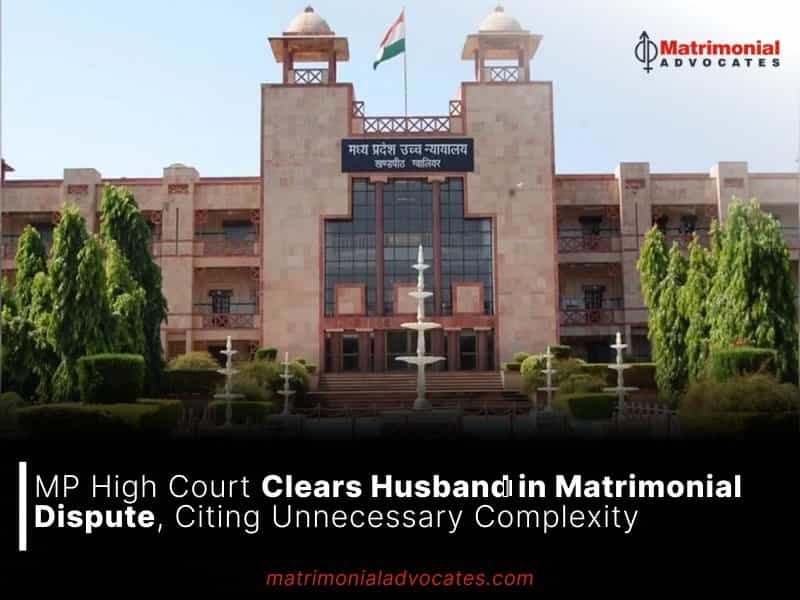
The Madhya Pradesh High Court, in reliance upon the mutual compromise between the matrimonial partners, invoked its jurisdiction under Section 482 of the Code of Criminal Procedure (CrPC) to extinguish the pending criminal case against the husband.
“If compromise between husband and wife is effectuated by the attempts of their family members, it will not only be good for society but also beneficial for their remaining life. The object of compromise is to settle down. The object of compromise is to settle in life and live peacefully”, the court noted while disposing of the matter.
Justice Prem Narayan Singh, serving as the solitary adjudicator, underscored the multifaceted role of the law, not limited to punitive measures but encompassing the preservation of peace, serenity, and societal harmony. The court also opined that the promotion of compromise in matrimonial disputes is a judicious approach to circumvent the temporal protraction inherent in court proceedings, which may endure over an extended period.
Given the circumstances of the case, where the husband and wife have amicably resolved their issues and deliberately chosen to live apart, the court additionally emphasized that an excessively strict and overly technical interpretation of the compromise could yield adverse outcomes.
“…therefore, hyper-technical view regarding the compromise can be counterproductive and against the interest of the woman and against the pious object for which the disputes between husband and wife have been settled, because in case the criminal proceedings are still permitted to continue then fresh series of dispute may start between the wife and the members of the family of her husband”, the bench sitting at Indore remarked.
While quashing the criminal proceedings, the court engaged in a comprehensive analysis of the judicial precedents set forth in Gian Singh v. State of Punjab and Anr. (2012) and B. S. Joshi v. State of Haryana (2003). This scrutiny culminated in the determination that the inherent jurisdiction vested in the High Court under Section 482 of the Code of Criminal Procedure (CrPC) is not circumscribed by the purview of Section 320 of the CrPC, which predominantly addresses the compounding of offenses.
The Gian Singh case, in particular, elucidated that the authority conferred upon the High Court by Section 482 of the CrPC operates independently from the provisions of Section 320 of the CrPC.
“…Inherent power is of wide plenitude with no statutory limitation but it has to be exercised in accord with the guidelines engrafted in such power viz; (i) to secure the ends of justice or (ii) to prevent abuse of the process of any Court”, a three-judge bench of Supreme Court opined while also adding that the decision to quash an FIR in matters where the offender and the victim have reached a settlement will depend on facts and circumstances of each case.
The top court, as mentioned in the Gian Singh case, pointed out that when it comes to dismissing cases, those with a strong similarity to civil matters are treated differently. The court also put offenses related to marriage, like dowry or family disputes, in the group of cases primarily dealing with personal and private issues.
“…In this category of cases, High Court may quash criminal proceedings if in its view, because of the compromise between the offender and victim, the possibility of conviction is remote and bleak and continuation of the criminal case would put the accused to great oppression and prejudice and extreme injustice would be caused to him by not quashing the criminal case despite full and complete settlement and compromise with the victim”, the apex court had observed back in 2012.
Background:
The petitioners were facing charges under various sections of the Indian Penal Code (IPC) and the Dowry Prohibition Act in an FIR. Their marital problems started in 2018. The wife, who filed the complaint, said she experienced harassment from her husband’s family over small issues. She also claimed that her family had given a lot of money to her husband for an Australian visa, but he wouldn’t take her with him.
In the High Court, the petitioners argued that they’d already been granted a divorce by an Australian court, and the FIR was just a way to trouble the husband and his family.
Later, both parties applied to drop the charges under Section 320 of the Criminal Procedure Code (CrPC), and the High Court checked and approved their agreement. The petitioners said that continuing the criminal case in the lower court would be a waste of time. They also agreed not to start any more legal proceedings about their marriage.
After their agreement was confirmed, the wife herself went to the High Court and asked them to stop the ongoing criminal case in the trial court.





